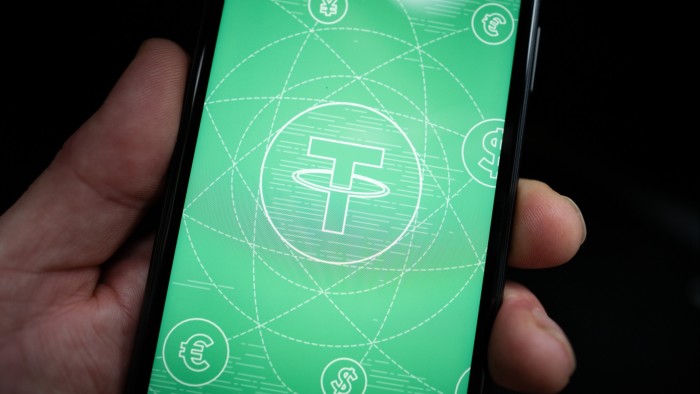Stay informed with free updates
Just sign up for the Cryptocurrency myFT Digest, delivered straight to your inbox.
Tether, one of the world’s largest cryptocurrency platforms, has emerged as one of the main payment methods for money launderers and fraudsters operating in Southeast Asia, the United Nations has warned.
The Tether crypto token, also known as Tether, is at the center of an exploding industry of fraud, including fake and The scam also involves creating a romantic connection, gaining the victim’s trust, and then seducing them. Get them to transfer large sums of money — a strategy commonly referred to as “pig slaughter.”
“In recent years, law enforcement and financial intelligence authorities have reported a rapid increase in the use of advanced, high-speed encrypted communications.
money laundering. . . A team specializing in underground tethers,” the report said.
The evolution of cryptocurrencies, along with other rapid technological developments, has reinvigorated a decades-old practice among organized crime groups in Southeast Asia of using black market casinos to launder illegal funds.
“Online gambling platforms, especially those operating illegally, have emerged as one of the most popular avenues for crypto-based money launderers, especially those using Tether,” the report said. The book says:
Jeremy Douglas, from the United Nations Office on Drugs and Crime, told the FT: “Organized crime has effectively created a parallel banking system using new technologies, and the proliferation of poorly or completely unregulated online casinos and cryptocurrencies are intensifying the region’s criminal ecosystem. I’m letting you do it.”
Tether’s digital token is a stablecoin. This is a cryptocurrency that typically tracks a hard currency to stabilize its price. Unlike cryptocurrencies such as Bitcoin, which are not pegged to a hard currency and are used primarily for speculative purposes, Tether is pegged to the US dollar and allows traders to enter and exit crypto trading. It is the largest of its kind, with approximately $95 billion in circulation.
A United Nations report says authorities have dismantled multiple money laundering networks in recent years that were involved in the movement of illegal Tether funds, including one in August last year when Singaporean authorities intercepted 737 million in cash and virtual currency. It points out that this includes operations that recovered dollars.
According to the report, in November last year, following a joint investigation with US authorities and cryptocurrency exchange OKX, Tether acquired $225 million worth of tokens linked to a “pig slaughter” and human trafficking syndicate in Southeast Asia. Frozen.
Erin West, a California-based criminal prosecutor and cybercrime expert, said pig butchers were drawn to Tether’s digital coin because the cryptocurrency promises fast and irreversible transactions on the blockchain. said.
“Tether is the mechanism of choice. . . . It’s fast, and you can’t reverse the transaction. Once the money is moved, it’s moved. You can’t reverse it,” West said.
“Coupled with get-rich-quick opportunities, it creates a situation where victims are blinded by love…They are being asked to buy something they are unfamiliar with, and before cryptocurrencies, There weren’t many opportunities like that,” she added.
“Cryptocurrency regulation is well behind or virtually non-existent, but organized crime groups who exploit and prey on vulnerabilities and weaknesses know this,” Douglas said. .
Despite widespread crackdowns on digital assets in the United States and elsewhere, criminal groups continue to embrace Tether’s tokens as an effective method of transferring funds, with some casinos taking special measures to handle the tokens. It has reached the point where it is starting to change.
A money laundering syndicate in Myanmar’s Shan State, which also operates in Cambodia, advertised Tether on busy streets and offered to exchange “black” tokens for cash, according to documents obtained by the FT. He even held up a sign promising it.
Tether did not respond to a request for comment.
Last November, the stablecoin operator announced that it had introduced US authorities to its platform to prevent fraudulent use of its tokens. The number of blacklisted Tether wallets has increased by about 27 percent since then, according to industry data provider CCData.
Tether has come under regulatory scrutiny in recent years over its asset management and relationships with financial institutions.
In 2021, US regulator Commodity Futures Trading Commission claimed that Tether made misleading statements that it had enough dollars to back its stablecoin. Tether paid a $41 million fine without admitting liability.
The FT revealed in November last year that Tether had deposited more than $1 billion in a subsidiary of Britannia Financial Group, founded by Venezuelan-Italian banker Julio Herrera Veltini, who announced that the He was indicted by U.S. authorities in August 2017 on suspicion of a bribery scheme. Mr. Veltini denies the accusations, and Britannia Financial has not been accused of any wrongdoing. The incident continues.

